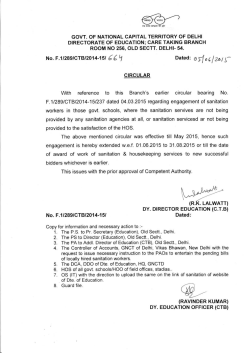
Clean India: Stimulating Behavior Change and Usage
Clean India: Stimulating Behavior Change and Usage Background At a population of more than 1.2 billion, a sixth of humanity lives in India and more than half of it defecates in the open. Prime Minister Narendra Modi has brought the issue of sanitation to the forefront through his Swachh Bharat campaign, promising a “Clean India” by 2019. One of the key initiatives in the campaign is for the government of India to provide more than 100 million toilets in rural India over the next five years. Provision of toilets is critical. Equally important is achieving widespread and lasting usage through appropriate design, regular maintenance, and behavior change. Toilets without behavior change will fail to materialize the full benefits of a complete WASH (Water, Sanitation, and Hygiene) ecosystem. Convening The University of Chicago Center in Delhi, in conjunction with the University of Chicago Booth School of Business’s Social Enterprise Initiative and nonprofit Toilet Hackers, is bringing the best minds together in 2015 to convene on the topic, facilitated by resource partner Samhita Social Ventures. The convening will offer a platform for meaningful engagement among various stakeholders to understand the sanitation challenges in India and build long-term collaborations that can advance sustainable solutions. The conference will bring together participants from the government of India, NGOs, leading academics, funders, and major corporations to further the conversation and forge relationships that enable the creation of and research on market-based strategies for interventions that drive social change. Richard H. Thaler, Charles R. Walgreen Distinguished Service Professor of Behavioral Science and Economics, faculty director of Chicago Booth’s Center for Decision Research, and president of the American Economic Association, will deliver remarks. Thaler’s book, Nudge: Improving Decisions About Health, Wealth, and Happiness, was a global best seller and the inspiration for the UK government’s “Nudge Unit,” which applies insights from behavioral economics and psychology to public policy and services. His next book, Misbehaving: The Making of Behavioral Economics, will be published in spring 2015. How to get involved This event is by invitation only. To express interest in attending, please contact Samhita@ChicagoBooth.edu. The expected outcomes of the convening are: • Drive critical thinking among stakeholders on various issues related to WASH • Showcase academic work on behavior change to influence innovative practices • Identify opportunities for academic research • Create an enabling ecosystem by identifying the need to support critical aspects of the WASH ecosystem (such as technology platform, application tools, building capacity, etc.) • Develop an “agenda for action” for holistic and sustainable solutions for different stakeholders DATE April 17, 2015 VENUE UChicago Center in Delhi DLF Capitol Point Baba Kharak Singh Marg Connaught Place New Delhi-110001 Clean India: Stimulating Behavior Change and Usage The Social Enterprise Initiative (SEI) at the University of Chicago Booth School of Business supports the aspirations of students and alumni to impact societal issues and furthers research on how institutions help solve social problems. Through ongoing curricular development, alumni and student programming, and support of faculty pursuits, SEI builds on Chicago Booth’s commitment to rigorous analysis and its discipline-based approach to understanding organizations, markets, and policy. The University of Chicago Center in Delhi provides a base for research, teaching, and dialogue among scholars from the university, across India, and around the world. The Center serves as a working space for UChicago faculty and students, a gathering place for alumni, and a forum for rekindling old relationships and forging new ones. It also provides opportunities for interaction with the university’s Hyde Park campus, its centers in Beijing and Paris, Chicago Booth campuses in London and Hong Kong, and other programs and facilities around the world. Toilet Hackers is a nonprofit organization committed to advancing widespread, safe, and sustainable access to sanitation. With the World Bank, it colaunched the world’s first global sanitation hackathon that was supported by the Bill & Melinda Gates Foundation. Currently, Toilet Hackers is partnering with the Sesame Workshop and World Association of Girl Guides and Girl Scouts to launch a global campaign with a focus on adopting WASH skills in India, particularly in the younger age groups. Samhita Social Ventures is a social sector consulting firm in India supported by the Nadathur Group, an initiative of N.S. Raghavan, a cofounder of Infosys Technologies. Samhita’s work is focused on shaping strategies for companies and foundations’ social initiatives, designing programs, creating multi-stakeholder partnerships and supporting on-ground implementation of projects. Currently, Samhita is assisting some of India’s leading companies to respond to the prime minister’s call to action by providing holistic and scalable CSR solutions in WASH. Doing Good Beer
© Copyright 2025











